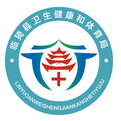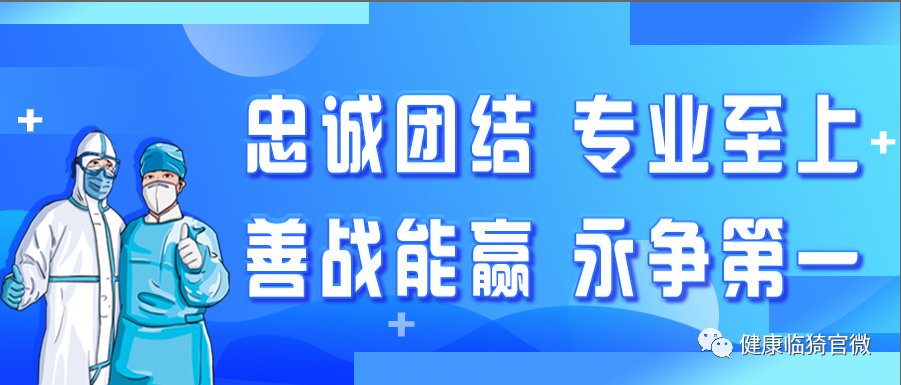
Why do some people gain weight just by drinking cold water,
while others “don’t gain weight even if they soak in an oil vat”?
Why do some feel hot in the same air-conditioned room,
while others feel cold?
Why are some people slow and steady,
while others are quick and fiery?
These are closely related to constitution.

According to different clinical manifestations and characteristics, TCM classifies constitution into ten categories: Qi Deficiency (Qi Xu), Yin Deficiency (Yin Xu), Yang Deficiency (Yang Xu), Blood Deficiency (Xue Xu), Qi Stagnation (Qi Yu), Damp-Heat (Shi Re), Phlegm-Damp (Tan Shi), Blood Stasis (Xue Yu), Special Constitution (Te Bing), and Harmonious Constitution (Ping He Ti Zhi). Different constitutions can be adjusted with corresponding medicinal diets or tea formulas to assist medicinal effects or prevent diseases.
In the previous issue, Dr. Cui Shichao from our hospital discussed the identification and adjustment of Qi Deficiency constitution.
Details: TCM teaches you to identify and adjust constitution to assist pregnancy, Qi Deficiency constitution adjustment.
This time, let’s take a look at what Yin Deficiency constitution is and how to adjust it?
Dietary Recommendations for Friends with Yin Deficiency Constitution
Main Characteristics of Yin Deficiency Constitution
The main characteristics of Yin Deficiency constitution include: relatively thin body type, prone to “generate empty heat”, hot palms and soles, flushed cheeks, irritable temperament, dry mouth and throat, night sweats, and dry stools. The tongue is red and dry with little coating, and the pulse is thin and rapid.
Dietary Therapy Principles
Nourish Yin and support Yin.
Recommended Dietary Therapies
1. Sha Shen (Adenophora) and Yu Zhu (Polygonatum) Soup with Lean Pork
Ingredients:
20g Sha Shen, 20g Yu Zhu, 10g Mai Dong (Ophiopogon), 400g lean pork, 2 figs, 3 slices of ginger.
Method:
① Clean the lean pork, cut into pieces, blanch in water, and set aside the other ingredients. ② Place all ingredients in a soup pot, add appropriate amount of water, bring to a boil over high heat, then simmer on low heat for 2 hours, season, and serve.
Characteristics:
Sha Shen nourishes Yin, clears the lungs, and benefits the stomach; Yu Zhu nourishes Yin, moistens dryness, and alleviates thirst. This soup is clear and sweet, nourishing Yin and generating fluids, clearing the lungs and moistening dryness.
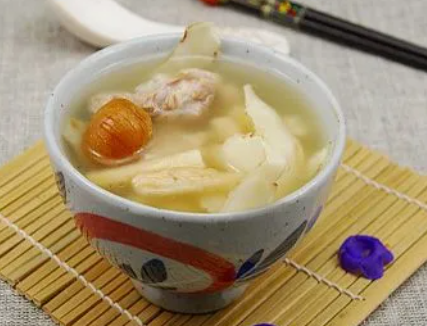
2. Tai Zi Shen (Pseudostellaria) and Bai He (Lily Bulb) Soup with Lean Pork
Ingredients:
30g Tai Zi Shen, 20g Bai He, half a small Luo Han Guo (Monk Fruit), 400g lean pork, 3 slices of ginger.
Method:
① Clean the lean pork, cut into pieces, blanch in water; clean Tai Zi Shen, Bai He, and Luo Han Guo. ② Place all ingredients in a soup pot, add appropriate amount of water, bring to a boil over high heat, then simmer on low heat for 2 hours, season, and serve.
Characteristics:
Tai Zi Shen is neutral in nature, sweet and slightly bitter, functions to tonify the lungs, strengthen the spleen, and generate fluids; Bai He is sweet and slightly cold, can moisten the lungs, stop cough, and calm the mind; Luo Han Guo is sweet and sour, cool in nature, has effects of clearing heat, cooling the blood, generating fluids, stopping cough, and moistening phlegm. This soup has the effects of benefiting Qi, generating fluids, and moistening the lungs, suitable for all types of people, especially those with Qi deficiency and lung dryness presenting with cough, shortness of breath, dry mouth, and throat.
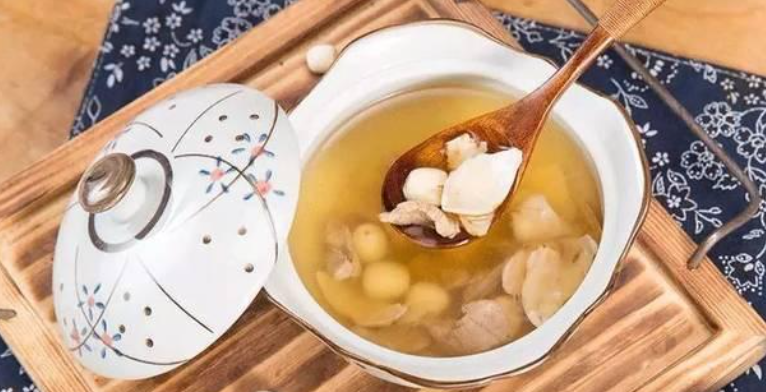
3. Shu Di Huang (Rehmannia) and Goji Berry Tea
Ingredients:
10g Shu Di Huang, 10g Goji Berries.
Method:
Infuse with boiling water and drink.
Characteristics:
Shu Di Huang is good for nourishing kidney Yin, Goji Berries nourish the liver and kidneys; the combination of these two herbs strongly nourishes Yin and supports the kidneys, and long-term consumption can improve Yin Deficiency constitution.
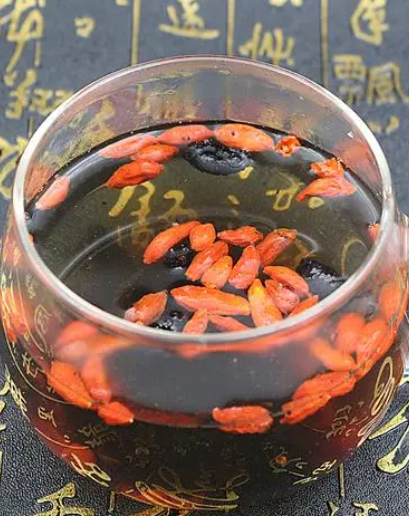
4. Shi Hu (Dendrobium) and Yu Zhu (Polygonatum) Tea
Ingredients:
10g Shi Hu, 15g Yu Zhu.
Method:
Boil with water and drink.
Characteristics:
Shi Hu nourishes the kidneys, supports the stomach, and brightens the eyes; Yu Zhu nourishes the Yin of the lungs and stomach; the combination of these two herbs has the effect of nourishing Yin and benefiting the stomach.


Warm Reminder
Generally, drink soup before meals, and the amount should not be too large, a small bowl is appropriate. Use cold water for soup preparation, and add boiling water for stewing. If you cannot accurately determine your constitution and symptoms, you need to choose soup formulas under the guidance of a TCM physician.
Soup formulas are not fixed and differ from medicinal formulas; they should taste good to ensure long-term consumption, and can be adjusted according to individual conditions.


